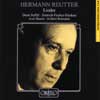Reutter Lieder
Beautifully crafted selection for Lied connoisseurs – but why no translations?
View record and artist detailsRecord and Artist Details
Composer or Director: Hermann Reutter
Genre:
Vocal
Label: Orfeo
Magazine Review Date: 2/2003
Media Format: CD or Download
Media Runtime: 75
Mastering:
Stereo
DDD
Catalogue Number: C121021A

Tracks:
| Composition | Artist Credit |
|---|---|
| (Die) Jahreszeiten |
Hermann Reutter, Composer
Axel Bauni, Piano Doris Soffel, Mezzo soprano Hermann Reutter, Composer |
| (4) Lieder |
Hermann Reutter, Composer
Axel Bauni, Piano Doris Soffel, Mezzo soprano Hermann Reutter, Composer |
| (5) Lieder |
Hermann Reutter, Composer
Axel Bauni, Piano Doris Soffel, Mezzo soprano Hermann Reutter, Composer |
| (3) Songs |
Hermann Reutter, Composer
Aribert Reimann, Piano Dietrich Fischer-Dieskau, Baritone Hermann Reutter, Composer |
| (3) Monologe des Empedokles |
Hermann Reutter, Composer
Aribert Reimann, Piano Dietrich Fischer-Dieskau, Baritone Hermann Reutter, Composer |
| Chamber Music |
Hermann Reutter, Composer
Aribert Reimann, Piano Dietrich Fischer-Dieskau, Baritone Hermann Reutter, Composer |
Author: Michael Oliver
At a casual glance or listen, Hermann Reutter (1900-85) might seem like a composer who did not so much continue the tradition of the German Lied well into the 20th century as distil its essence. Something rather like that seems to be happening in the first of four settings of Hölderlin poems about the seasons (Die Jahreszeiten): a delicately bare keyboard part supports a vocal line so responsive to words that it almost sounds like recitative. Yet it does not speak, it sings, and the piano adds a tiny flourish when the text speaks of the ‘friendly smiles’ brought by spring.
By the third song of the sequence, however, the vocal line remains smooth but the keyboard, reacting to the more troubled imagery of ‘Autumn’, approaches tonal ambiguity. Reutter, it gradually becomes apparent, has not rejected the 20th century but has adopted those elements of it that are compatible with the essence of the tradition in which he is rooted.
Words are paramount. They are set mostly syllabically, with very economical keyboard writing adding flecks of colour or discreet but firm support. Reutter’s purpose is always to project the text as faithfully as possible. Thus big, declamatory gestures and intense expression for the lofty oratory of the monologues from Hölderlin’s The Death of Empedocles, but the most transparent precision for the subtly precise imagery of Nelly Sachs, gripping little epigrams for James Joyce (set in English), bare and striking simplicity for the concentrated vividness of Marie Luise Kaschnitz.
He is a song-writer for connoisseurs of Lieder, still more for those of German verse, but alas, Orfeo have not provided translations of the German poems (the English ones, ‘at the desire of James Joyce’s heirs’, are entirely absent), and for a composer like Reutter that is a disastrous omission. Both singers are passionately committed to this music, and both are in fine voice; both pianists (joint editors of this series of discs) are alertly responsive, but to restrict such a rare and subtle composer to those who speak German is a sad disservice to him and to all those who do not speak German but love German song.
By the third song of the sequence, however, the vocal line remains smooth but the keyboard, reacting to the more troubled imagery of ‘Autumn’, approaches tonal ambiguity. Reutter, it gradually becomes apparent, has not rejected the 20th century but has adopted those elements of it that are compatible with the essence of the tradition in which he is rooted.
Words are paramount. They are set mostly syllabically, with very economical keyboard writing adding flecks of colour or discreet but firm support. Reutter’s purpose is always to project the text as faithfully as possible. Thus big, declamatory gestures and intense expression for the lofty oratory of the monologues from Hölderlin’s The Death of Empedocles, but the most transparent precision for the subtly precise imagery of Nelly Sachs, gripping little epigrams for James Joyce (set in English), bare and striking simplicity for the concentrated vividness of Marie Luise Kaschnitz.
He is a song-writer for connoisseurs of Lieder, still more for those of German verse, but alas, Orfeo have not provided translations of the German poems (the English ones, ‘at the desire of James Joyce’s heirs’, are entirely absent), and for a composer like Reutter that is a disastrous omission. Both singers are passionately committed to this music, and both are in fine voice; both pianists (joint editors of this series of discs) are alertly responsive, but to restrict such a rare and subtle composer to those who speak German is a sad disservice to him and to all those who do not speak German but love German song.
Discover the world's largest classical music catalogue with Presto Music.

Gramophone Digital Club
- Digital Edition
- Digital Archive
- Reviews Database
- Full website access
From £8.75 / month
Subscribe
Gramophone Full Club
- Print Edition
- Digital Edition
- Digital Archive
- Reviews Database
- Full website access
From £11.00 / month
Subscribe
If you are a library, university or other organisation that would be interested in an institutional subscription to Gramophone please click here for further information.




